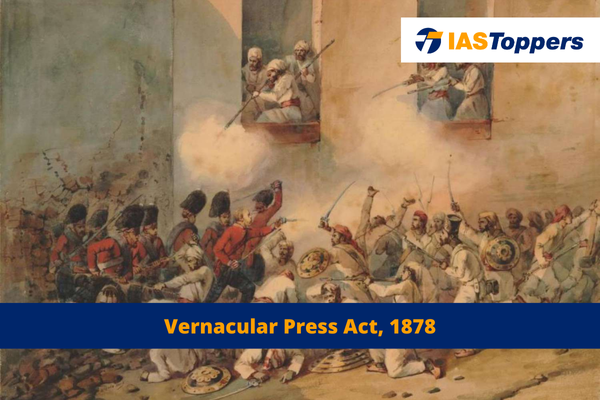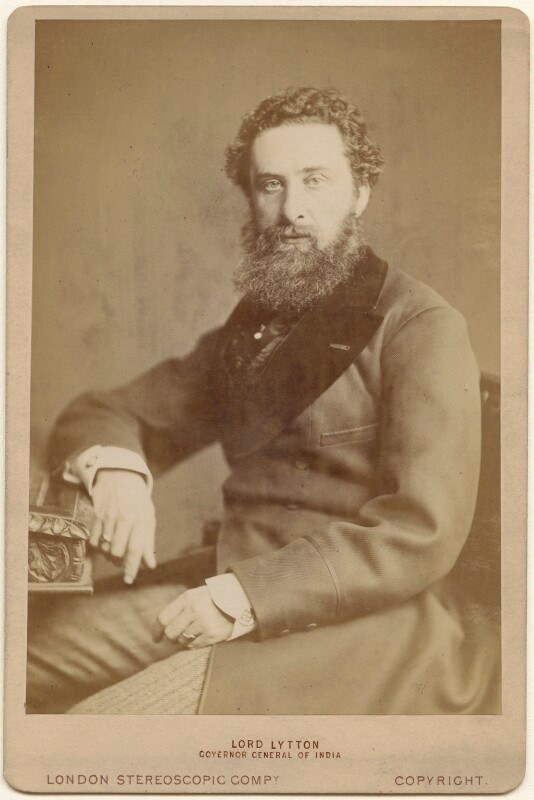The Vernacular Press Act 1878 was a law passed in India to restrict the freedom of the non-English press. It was introduced by Lord Lytton, the viceroy of India at that time, with the aim of silencing negative opinions about British rule, especially in relation to the Second Anglo-Afghan War. The Act was a response to growing public criticism and seditious articles that were fuelling discontent among the local population. In this article, you will know about background, key features and impact of Vernacular Press Act, 1978. To explore more interesting UPSC Modern Indian History topics of GS Paper – 1 like Vernacular Press Act, 1878 of NCERT Class 8 and Class 10, check out other articles and IAS Notes of IASToppers.
Table of Content
- What is Vernacular Press Act 1878?
- Background and History of Vernacular Press Act 1878
- Key features of Vernacular Press Act 1878
- Impact of Vernacular Press Act 1878
- Reactions post revocation of Vernacular Press Act 1878
- Conclusion
- FAQs on Vernacular Press Act 1878
What is Vernacular Press Act 1878?
- The Vernacular Press Act of 1878 was enacted in 1878 to curtail the freedom of the Indian-language (i.e., non-English) press.
- It was proposed by Lord Lytton, then viceroy of India (governed 1876–80).
- The objective of Vernacular Press Act of 1878 was to suppress the local press and hinder any negative commentary about British rules, particularly the resistance emerging due to the Second Anglo-Afghan War (1878-80).
- It was enacted due to increasing public criticism and seditious articles that stirred dissatisfaction among the local population.
- The act was inspired by the Irish Press Act.
- The Vernacular Press Act, 1878 was repealed in 1881 by Lord Ripon.
Background and History of Vernacular Press Act 1878
- The Indian press occasionally conflicted with the East India company’s objectives.
- The first newspaper, Hicky’s Bengal Gazette, was outlawed in 1782 following criticisms against the East India Company.
- In the 1857 Indian Rebellion, Lord Canning enacted Gagging Act to manage printing presses and control published content.
- Post-1858, the European press often backed the government during political disputes, while the vernacular press criticized it.
- In following years, on top of severe famine of 1876-77 and extravagant spending on the imperial Delhi Durbar, widespread public disapproval was also observed against Lord Lytton’s imperialistic policies.
- In 1978, The Vernacular Press Act (VPA) was created to regulate the vernacular press and penalize seditious content effectively.
Key features of Vernacular Press Act 1878
The government had the following powers under this Act:
- It gave any magistrate or Police Commissioner the right to require any printer or publisher to pledge not to print certain content and could seize any material they considered unsuitable.
- Moreover, they may be asked to deposit a security, which could be seized if they violated the terms, and their press equipment could be confiscated in the case of repeated offences.
- The Act required all content proof sheets to be submitted to the police before publication, and what was considered seditious news was decided by the police, not the judiciary.
- The Act allowed the government to censor reports and editorials in the local press. When a newspaper published content deemed as seditious, the government issued a warning.
- Vernacular newspapers could seek exemption from the Act by presenting proofs to a government censor.
- Violations of these restrictions were punishable by law, but no recourse could be sought in any court in the country.
Impact of Vernacular Press Act 1878
- It resulted in strong and sustained protests from a wide spectrum of the Indian populace.
- Many papers were fined and their editors imprisoned under this Act.
- Legal action was initiated against Som Prakash, Bharat Mihir, Dacca Prakash and Samachar under the Vernacular Press Act (VPA).
- Amrita Bazar Patrika converted into an English daily to evade this act.
- Due to extensive objections, the act was ultimately annulled by Lord Ripon in 1882.
Reactions post revocation of Vernacular Press Act 1878
- In 1883, Surendranath Banerjea was the first Indian journalist to face jail time after he criticized a Calcutta High Court judge in an editorial in ‘The Bengalee’ for disregarding Bengali religious feelings in a ruling.
- Bal Gangadhar Tilak, closely linked with the press freedom movement, used his newspapers, Kesari and Maharatta, as well as Ganapati and Shivaji festivals to propagate anti-imperialist sentiments from 1893 onwards.
- Tilak suggested that lower-middle-class individuals, farmers, artisans, and workers be included in Congress and organized a Maharashtra-wide foreign cloth boycott in 1896.
- He initiated a no-tax campaign in Maharashtra in 1896-97, advising farmers not to pay revenue if their crops failed.
- A plague outbreak occurred in Poona in 1897, and despite Tilak’s support for the government’s efforts to combat the plague, there was widespread resentment against the government’s ruthless methods.
- The government, hoping to quell the rising rebellion in the press, targeted Tilak as an example, arresting him after the publication of the poem, ‘Shivaji’s Utterances’, in Kesari and a speech he delivered justifying Shivaji’s murder of Afzal Khan.
- Tilak was found guilty, and along with other editors, provoked wide-scale protests. Tilak became a national figure, respected by the people and titled ‘Lokmanya’.
- In 1898, the government revised Section 124A and introduced Section 153A, criminalizing any contempt or hatred towards the Government of India or creating discord among different classes, leading to nationwide protests.
- Amidst the Swadeshi and Boycott Movements and the rise of militant nationalism, several suppressive laws were enacted.
- The Newspaper (Incitement to Offences) Act of 1908 was established to curb radical nationalistic activities.
- It permitted magistrates to seize assets of newspapers that published harmful content, inciting violent behaviors or murder.
- Tilak, a militant nationalist leader, was charged with sedition and sentenced to six years in Mandalay, Burma, which ignited massive protests across India.
- The Indian Press Act of 1910 reintroduced the harshest aspects of the Vernacular Press Act.
- It authorized local governments to ask for a security deposit during registration from the printer/publisher and cancel the registration if the newspaper violated rules.
- Moreover, every printer was obliged to deliver two complimentary copies of each issue to the local government.
Conclusion
The Vernacular Press Act 1878, infamously known as “the gagging Act,” was particularly criticized for its discriminatory stance towards English and vernacular press, and the denial of any right to appeal. Its oppressive measures and discriminatory approach sparked widespread protests and played a crucial role in shaping the Indian independence movement. The anger it provoked among Indians played a significant role in sparking the independence movement. The Indian Association, founded in 1876 and often seen as a precursor to the Indian National Congress established in 1885, was one of the most outspoken critics of the Act.
Ref:Source-1
| Other Articles in History & Culture | |
| Charter Act Of 1813 | Government of India Act 1919 |
| The Indian Councils Act 1861 | Subsidiary Alliance System |
| Poona Pact (1932) | Savitri Jyotiba Phule |
FAQs(Frequently Asked Questions)
Why was the Vernacular Press Act 1878 passed?
The Vernacular Press Act of 1878 was passed to curb criticism of British rule in India, especially resistance towards the Second Anglo-Afghan War, by controlling the content of non-English press outlets.
Vernacular Press Act 1878 was implemented in which year?
The Vernacular Press Act 1878 was implemented in the year 1878, during the British rule in India.
What was the role of vernacular press in freedom struggle?
The vernacular press played a crucial role in the Indian freedom struggle, by fostering nationalist sentiments, mobilizing public opinion against British rule, and protesting discriminatory laws like the Vernacular Press Act.
Which viceroy passed the vernacular press act of 1878?
The Vernacular Press Act 1878 was passed under the governance of Lord Lytton, the then Viceroy of India.



